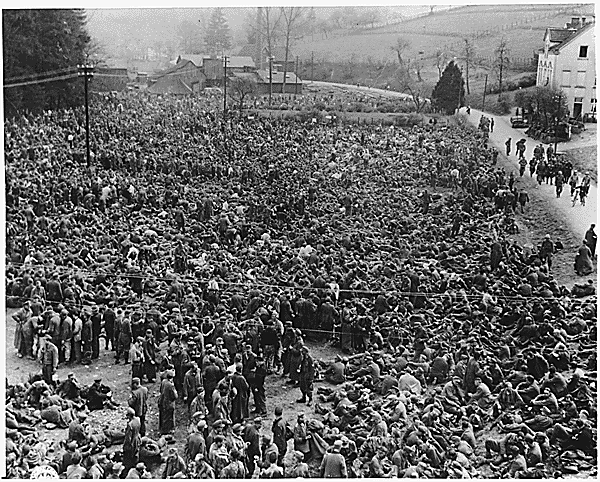Did anyone else actually try reading that tripe. There isn't one reference in it. Virtually all of it reads like fiction the author (also unnamed) made up. If you read actual German POW accounts, like William B. Folkestad's
Panzerjäger: Tank Hunter, the last two chapters are his experience at the end of the war becoming a POW. It reads entirely different from the crap on the webpage.
The first thing that stands out is Folkestad focuses on food as the POW's priority. He tells how he was assigned to a supply depot where he drove a forklift, then was assigned to drive a truck (a "duce and a half" from the description). He says they were put in tents, and got food even if he'd often have liked much more.
That's what the more permanent camps in the COMZ (Zone of Communications) or the rear areas away from the front looked like. Temporary pens near the front were more like this:
These were temporary holding areas and the POWs were marched towards the COMZ in stages. In 1945 there were so many that it took quite a while to move them into more permanent camps. Because of the sheer number of prisoners taken, the camps used 10 and 20 man tents and usually housed double that number of POW's. They were given blankets and straw initially, later bunks were issued.
There was a serious attempt by the US to keep disease down and proper latrines dug, cooking and washing facilities made, delousing with DDT was common.
If anything, the French--who also ran camps in their sectors--were the most brutal to the Germans. They had an axe to grind. The British handed over a large number of their POWs in Germany to the Russians on the later's request. This usually ended very badly for those POW's.
This is one of a series of photos of one of the only formal surrenders of an entire German unit in early 1945, a few months before the end of the war.
This was S. PzJr Abt. 512 commanded by Hamptmann (Captain) Albert Ernst, at Iserlohn Germany in the Ruhr. A surrender was negotiated, and the unit drove it's vehicles into the town square where the troops paraded and stacked their arms in an orderly fashion before being marched off to a POW camp.
Some of the most bullshit lines in that fiction include:
No food for weeks? Yea, sure... POW's got rations, spotty in the temporary holding camps near the front, but regularly once in the COMZ. In fact, the US once the war ended issued the food in bulk to the Germans who organized their own cooks and were issued mess gear and a field kitchen per so many men. Camps were organized into smaller groups within the whole camp and each area got it's own mess and latrine facilities.
Frostbite? The war in Europe ended in May 1945, at the beginning of summer...



